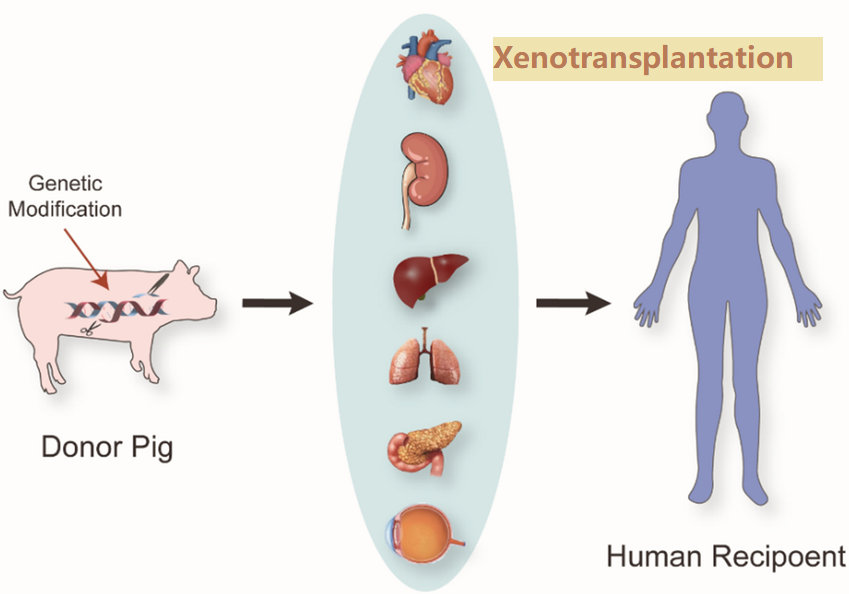AWIP, Ethics, Science & Technology, Technology
Q. Discuss the concept of “Xenotransplantation” and its potential to address the organ transplant shortage. What are the main scientific, ethical, and medical challenges associated with xenotransplantation? How can these challenges be mitigated?
| Why in News?:
On 11th May, 2024, Richard Rick Slayman (American), the first recipient of a pig kidney transplant, died two-months post-surgery. This raises the discussion on the future of ‘xenotransplantation’. Why Pig?: Because of the anatomical similarities, widespread breeding and adaptability of organ sizes to human needs. |
Introduction:
Xenotransplantation is the process of transplanting organs, tissues, or cells from one species to another. Primarily, this involves using animal organs, typically from pigs, for transplantation into humans. This innovative approach aims to address the severe shortage of human organs available for transplantation, which leads to long waiting times and high mortality rates among patients needing transplants.
Potential to Address Organ Transplant Shortage:
Xenotransplantation holds significant potential in mitigating the organ transplant shortage by providing an alternative source of organs. This can:
-
- Alleviate the demand-supply gap for organs.
- Reduce waiting times for patients on transplant lists.
- Potentially provide a stable and renewable source of organs, tissues, and cells.
Scientific Challenges:
-
- Immune Rejection:
- The human immune system naturally rejects foreign tissues, leading to transplant failure.
- Hyperacute rejection, acute vascular rejection, and chronic rejection are major barriers.
- Genetic Differences:
- Significant genetic and physiological differences between species can complicate the transplantation process.
- Disease Transmission:
- The risk of transmitting zoonotic diseases (diseases that can jump from animals to humans) is a serious concern.
- Porcine endogenous retroviruses (PERVs) in pigs pose a potential risk to human recipients.
- Immune Rejection:
Ethical Challenges:
-
- Animal Welfare:
- The use of animals, particularly primates and pigs, raises ethical concerns about their treatment and rights.
- Informed Consent:
- Ensuring that recipients are fully informed about the risks and benefits of xenotransplantation.
- Public Perception:
- Societal acceptance and ethical considerations regarding crossing species barriers and the use of animal organs in humans.
- Animal Welfare:
Medical Challenges:
-
- Immunosuppression:
- The need for powerful immunosuppressive drugs to prevent rejection, which can have significant side effects and long-term health implications.
- Compatibility:
- Ensuring that animal organs are compatible with human physiology to function effectively in the long term.
- Long-term Outcomes:
- Limited data on the long-term success and viability of xenotransplants.
- Immunosuppression:
Mitigation Strategies:
-
- Genetic Engineering:
- Advancements in genetic modification techniques, such as CRISPR, can be used to modify donor animals to reduce immune rejection and enhance compatibility.
- Creating transgenic pigs with human-compatible organs.
- Disease Screening:
- Rigorous screening and breeding practices to eliminate the risk of zoonotic disease transmission.
- Ethical Regulations:
- Developing comprehensive ethical guidelines and regulatory frameworks to ensure humane treatment of donor animals and address public concerns.
- Transparent and thorough informed consent processes for recipients.
- Advanced Immunosuppressive Therapies:
- Research and development of more targeted and less harmful immunosuppressive treatments.
- Monitoring and Research:
- Continuous monitoring of recipients and long-term studies to gather data on the efficacy and safety of xenotransplantation.
- Genetic Engineering:
Conclusion:
Xenotransplantation presents a promising solution to the critical shortage of human organs for transplantation. However, it brings with it a host of scientific, ethical, and medical challenges that need to be carefully addressed. Through advancements in genetic engineering, stringent disease control, ethical regulations, and improved immunosuppressive therapies, these challenges can be mitigated. The successful implementation of xenotransplantation could revolutionize the field of organ transplantation, offering hope to countless patients worldwide.


